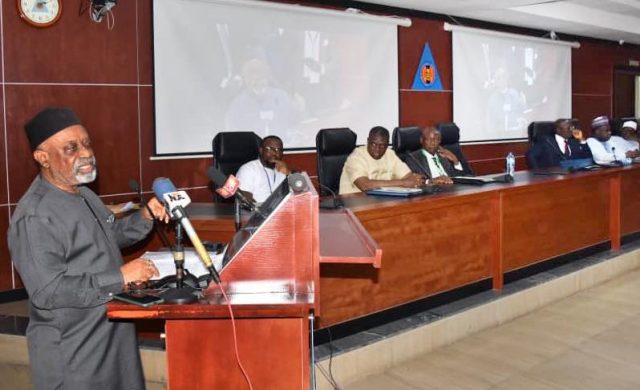TUE, 20 SEPT, 2022-theGBJournal| The Minister of Labour and Employment Chris Ngige, Monday, said the Federal Government did not take the Academic Staff Union of Universities (ASUU) to court over the prolonged strike of the Union, as some people claimed.
‘’Some people said Federal Government took ASUU to court. No. I referred the matter after seven months of Protracted discussions and negotiation failed,’’ the Minister insisted.
The Minister argued that he would have failed in his duties if he did not refer the matter to the National Industrial Court of Nigeria (NICN) after seven months of protracted discussions and negotiations with ASUU, which failed.
The Minister spoke in Abuja at the public presentation of the Nigerian Labour Congress (NLC) at 40 publication, titled, ‘’Contemporary History of Working Class Struggles.’’
Ngige recalled that ASUU was at the stage of CBA negotiation with their employers, the Federal Ministry of Education when they embarked on strike.
He lambasted the ASUU leadership for not understanding the import of CBA negotiation, saying ‘’the leadership of ASUU lacked the nutrients of labour unionism.’’
‘’We have to counsel our brothers on negotiation. No negotiation is forced. You cannot say it is either you give me 200 percent or I will continue to strike. There are laws guiding strikes. There are International Labour Organisation (ILO) principles on right to strike, Nobody can take that away. But there are things that follow it when you embark on a strike as a worker, and they are enshrined in the laws of our land. It is written in Trade Dispute Act. The ILO principles of strike talks about the right of a worker to withdraw services,’’ Ngige argued.
He added: ‘’There is also right to picket. These are things that are done. Nigeria is respected in ILO.’’
Ngige recalled that he conciliated the dispute twice, first in February 22, one week after commencement of the strike and agreements were reached, and he brought everybody back on March 1 for another conciliation.
According to him, the only thing left was going back to the Federal Ministry of Education for renegotiation of the 2013 agreement.
‘’Some people are saying 2009 agreement. The 2009 agreement has been renegotiated in 2013/2014 with the administration of former President Goodluck Jonathan. It is an anthema to use 2009 agreement.
He said what is left is the negotiation of their conditions of service, which is their right.
‘’It should be done but they are negotiating it under the principle of offer and acceptance, and it broke down irretrievably there at the Federal Ministry of Education. That Kick-started Section 17 of the Trade Dispute Act, whereby the Minister of Labour and Employment, whoever it was, if you don’t transmit according to the dictates of Section 17, TDA, 2004, Laws of Nigeria, you would have failed your function. Therefore, I had to transmit.’’
Ngige, however, said the transmission does not mean that the matter cannot be settled out of court. He said either of the parties involved, the Federal Government and ASUU, could approach the NICN for out of court settlement, arguing again that Nigeria must be guided by laws and ‘’nobody should use the dispute to harangue anybody.’’
‘’The Pro Chancellors said they want to do counter offer. I told them to do it as quickly as possible. These are ingredients of labour relations. It is not enough if you misinform your membership. That should be disservice. We should read through things as it is and interpret same way. If I leave them in education, they will stay there two years.’’
Regarding the issue of inflation and workers salary, Ngige assured that the Federal Government will adjust workers salaries to meet current realities. He said although they inserted a provision in the 2019 Minimum Wage Act to review wages either next year or 2024, the Federal Government has started the review with ASUU.
Twitter-@theGBJournal| Facebook-The Government and Business Journal|email: gbj@govbusinessjournal.ng|govandbusinessj@gmail.com










